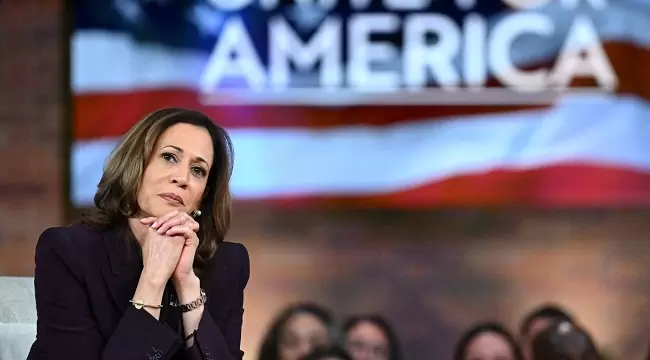Kamala Harris Accuses Trump Administration of Abandoning American Ideals

In a pointed critique, Vice President Kamala Harris recently declared, “Instead of an administration working to advance America’s highest ideals, we are witnessing the wholesale abandonment of those ideals.” The statement, delivered with her characteristic blend of conviction and urgency, encapsulates a broader narrative that Harris and other Democratic leaders have pushed: that the Trump administration’s actions represent a betrayal of the foundational principles that define the United States. But what exactly does Harris mean by “America’s highest ideals,” and how does her accusation hold up under scrutiny? This article explores the context, implications, and counterarguments surrounding her claim.
The Context of Harris’s Statement
While the quote itself is concise, it reflects a recurring theme in Harris’s rhetoric during and after the Trump presidency (2017–2021). As a senator during much of Trump’s term and later as vice president, Harris frequently positioned herself as a defender of democratic norms, civil rights, and inclusivity—values she argues were undermined by Trump’s policies and leadership style. The statement likely draws from a well of specific grievances, including Trump’s approach to immigration, racial justice, election integrity, and foreign policy, among others.
For instance, Harris has previously criticized the Trump administration’s “zero tolerance” immigration policy, which led to family separations at the U.S.-Mexico border. She called the policy “inhumane” and argued it violated America’s commitment to compassion and human rights. Similarly, she condemned Trump’s response to the 2020 racial justice protests following George Floyd’s death, accusing him of stoking division rather than promoting unity. Her claim about abandoning ideals could also point to the January 6, 2021, Capitol riot, which she and other Democrats have linked to Trump’s rhetoric and refusal to concede the 2020 election.
Without a specific speech or date tied to this quote, it’s reasonable to assume it aligns with these broader critiques. Harris’s use of “wholesale abandonment” suggests a systemic failure, not just isolated missteps, painting the Trump administration as fundamentally at odds with American values.
Defining “America’s Highest Ideals”
The phrase “America’s highest ideals” is evocative but subjective, open to interpretation based on political perspective. For Harris, these ideals likely include:
- Democracy: The rule of law, free and fair elections, and respect for institutional norms. Democrats, including Harris, have argued that Trump’s challenges to the 2020 election results and his role in the January 6 insurrection threatened democratic principles.
- Equality and Justice: Harris has emphasized racial and economic equity, pointing to policies like the Affordable Care Act or criminal justice reform as embodying these values. She’s framed Trump’s rollback of certain protections—such as those for LGBTQ+ individuals or minority voting rights—as a retreat from fairness.
- Compassion and Inclusivity: America’s identity as a nation of immigrants and a refuge for the oppressed is central to Harris’s worldview. She’s criticized Trump’s travel bans targeting Muslim-majority countries and his rhetoric on immigration as antithetical to this ethos.
- Global Leadership: Harris has argued that America’s role as a moral and diplomatic leader was diminished under Trump, citing his withdrawal from agreements like the Paris Climate Accord and his approach to allies and adversaries alike.
These ideals, while resonant for many, are not universally defined. Harris’s critics, particularly Trump supporters, might argue that her framing ignores competing visions of American values, such as individual liberty, economic self-reliance, or national sovereignty.
The Trump Administration’s Counter-Narrative
To understand the full picture, it’s worth examining how the Trump administration and its supporters might respond to Harris’s accusation. Far from abandoning American ideals, they argue that Trump’s policies sought to restore and prioritize a different set of principles:
- Economic Prosperity: Trump’s administration touted record-low unemployment rates (pre-COVID), particularly for Black and Hispanic Americans, as evidence of advancing opportunity. Tax cuts and deregulation were framed as empowering individuals and businesses, aligning with ideals of free-market capitalism.
- National Security and Sovereignty: Policies like the border wall and immigration restrictions were justified as protecting American citizens and preserving national identity. Supporters argue that prioritizing “America First” was a reclamation of patriotic ideals, not a rejection of them.
- Individual Liberty: Trump’s resistance to certain progressive policies—such as expanding government healthcare or imposing COVID-19 mandates—was framed as defending personal freedom against overreach. His judicial appointments, including three Supreme Court justices, were celebrated for upholding constitutional originalism.
- Strength in Foreign Policy: While critics decried Trump’s withdrawal from multilateral agreements, supporters praised his tough stance on China, brokering of the Abraham Accords, and avoidance of new foreign wars as bold, pragmatic leadership.
From this perspective, Harris’s claim of “wholesale abandonment” is not just exaggerated but a mischaracterization of a presidency that resonated with millions of Americans. Trump’s base might argue that Harris and the Democratic establishment are imposing their own definition of “ideals” while dismissing the values—self-reliance, patriotism, and skepticism of elites—that Trump championed.
Analyzing the Divide
Harris’s statement is less a policy critique and more a moral indictment, aimed at rallying those who share her vision of America while casting Trump as an existential threat to it. This rhetorical strategy is effective for mobilizing supporters but risks deepening polarization by framing the debate in absolutist terms. The phrase “wholesale abandonment” leaves little room for nuance, implying that Trump’s actions were uniformly detrimental to American values.
In reality, the Trump administration’s record is complex. For every policy critics point to as un-American—say, the travel ban or family separations—supporters can cite achievements like criminal justice reform (the First Step Act) or diplomatic breakthroughs that align with traditional American leadership. Similarly, while Harris frames Trump’s rhetoric as divisive, his supporters see it as a refreshingly honest rejection of political correctness.
The truth likely lies in a messy middle: American ideals are not a monolith, and both sides cherry-pick values to suit their narratives. Harris’s accusation resonates with those who see Trump’s tenure as a low point for democracy and civility, but it alienates those who view his presidency as a corrective to decades of elitism or globalism. The lack of specificity in her quote allows for broad interpretation, which is both its strength and its weakness.
Broader Implications
Harris’s statement reflects a deeper struggle over who gets to define “American ideals” in a polarized era. As the United States grapples with questions of identity, governance, and global role, accusations like hers are unlikely to bridge divides. Instead, they fuel a cycle of mutual distrust, where each side claims to be the true guardian of America’s soul.
For Harris, the quote is a call to action, urging Americans to reject what she sees as a dangerous deviation from the nation’s best self. For Trump’s supporters, it’s another example of Democratic sanctimony, dismissing their priorities as un-American. As of May 1, 2025, with political tensions still high, the debate over America’s ideals remains unresolved, and Harris’s words are but one salvo in a much larger battle.
Conclusion
Kamala Harris’s assertion that the Trump administration abandoned America’s highest ideals is a powerful rhetorical jab, rooted in her and her party’s critique of Trump’s policies and leadership. It taps into real concerns about democracy, equality, and compassion but risks oversimplifying a complex presidency that millions still view as a triumph. By leaving “ideals” undefined, Harris invites both agreement and pushback, reflecting the fractured state of American political discourse. As the nation moves forward, the challenge will be finding common ground on what those ideals truly are—and how to live up to them.






